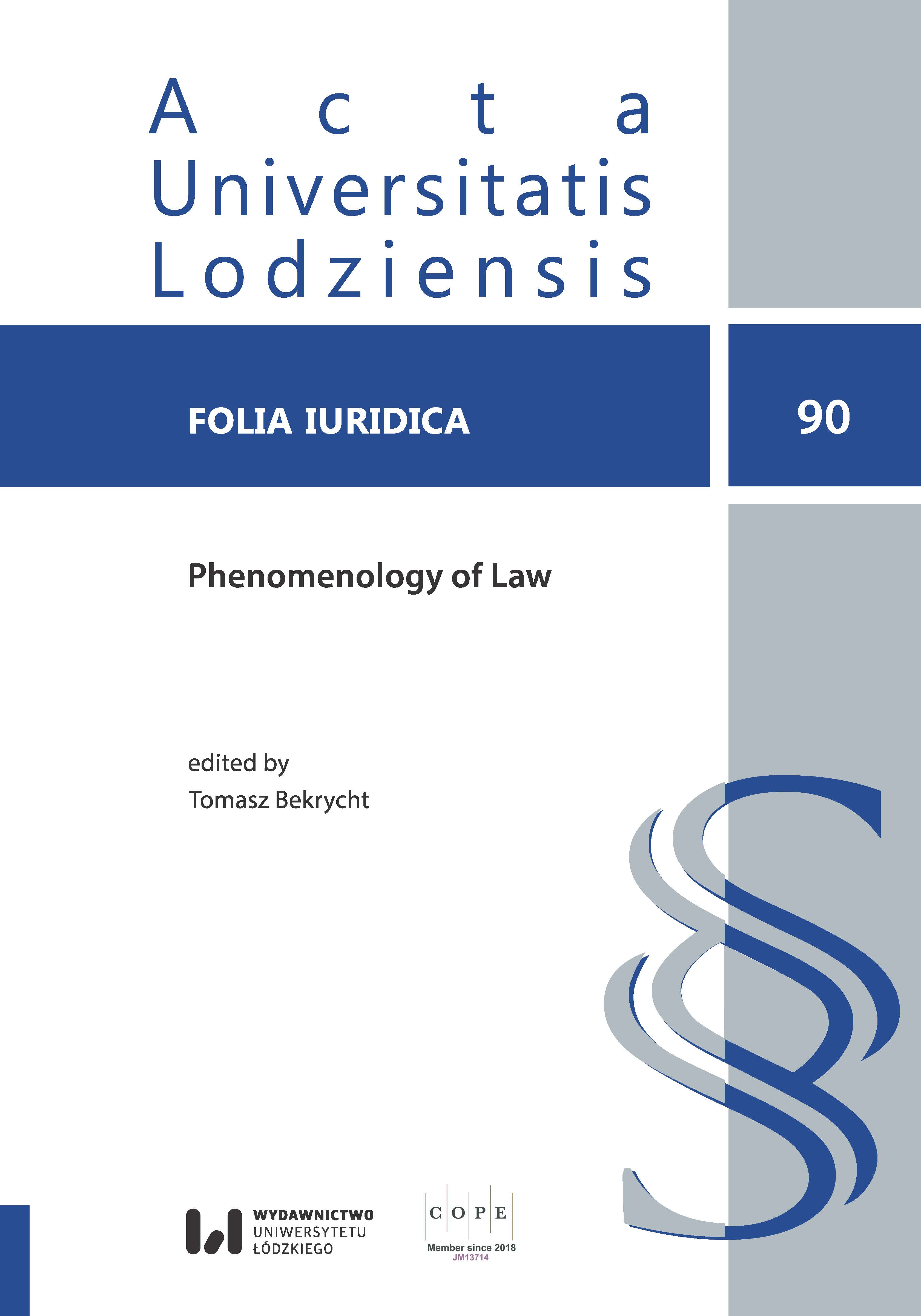Reinach and Kantorowicz: Justice, Phenomenological Realism and the Free Law Movement
DOI:
https://doi.org/10.18778/0208-6069.90.07Keywords:
Reinach, Kantorowicz, Justice, Free Law, PhenomenologyAbstract
Adolf Reinach met and befriended Hermann Kantorowicz in one of Lujo Brentano’s political economy seminars during the 1901/1902 academic year at the University of Munich. After Munich, Kantorowicz would go on to be a major contributor to the Free Law Movement (Freirechtsbewegung) in Germany and play an important role in the development of the sociology of law in the 20th century. Reinach encountered the work of Edmund Husserl while studying with Lipps and later became central to the phenomenological movement in Göttingen. But all the while he remained interested in and focused on issues related to justice. His last scholarly publication before leaving for battle in WWI, Die apriorischen Grundlagen des bürgerlichen Rechtes (The a priori Foundations of Civil Law, 1913) published in the very first edition of the Jahrbuch für Philosophie und phänomenologische Forschung (Yearbook for Philosophy and Phenomenological Research) is a testament to this. Here we see Reinach taking his phenomenological education and applying it to entities of justice. I believe Kantorowicz inspired this lasting interest in matters of justice.
This essay will focus on the influence of Kantorowicz on Reinach, and while doing so attempt to flesh out and contrast the ways in which these two men sought to overcome the problems of justice (Recht) of their time. Many of these problems still continue to be relevant today.
Downloads
References
Baltzer-Jaray, Kimberly. 2016. “The Intentional Being of Justice and the Foreseen”. In Essays on Aesthetic Genesis. 65–76. Edited by Charlene Elsby, Aaron Massecar. Toronto: University Press of America.
Google Scholar
Baltzer-Jaray, Kimberly. 2016. “Phenomenological Jurisprudence: A Reinterpretation of Adolf Reinach’s Jahrbuch Essay”. In Phenomenology for the Twenty-First Century. 117–137. Edited by J. Aaron Simmons, J. Edward Hackett. London: Palgrave Macmillan Publishers.
Google Scholar
DOI: https://doi.org/10.1057/978-1-137-55039-2_7
Berkowitz, Roger. 2010. The Gift of Science: Leibniz and The Modern Legal Tradition. New York: Fordham University Press.
Google Scholar
Coyle, Sean and George Pavlakos. Eds. 2005. Jurisprudence or Legal Science? A Debate About the Nature of Legal Theory. Oxford–Portland: Hart Publishing.
Google Scholar
Flavius, Gnavius. 2006. “The Battle for Legal Science”. Translated by Cory Merrill. German Law Journal 12(11): 2005–2030.
Google Scholar
DOI: https://doi.org/10.1017/S2071832200017673
Herget, James E., Stephen Wallace. 1987. “The German Free Law Movement as the Source of American Legal Realism”. Virginia Law Review 73(2): 399–455.
Google Scholar
DOI: https://doi.org/10.2307/1073069
Mitscherling, Jeff. 2010. Aesthetic Genesis: The Origin of Consciousness in the Intentional Being of Nature. New York: University Press of America Inc.
Google Scholar
Nelken, David. 1981. “The Gap Problem in the Sociology of Law: A Theoretical Review”. Windsor Yearbook of Access to Justice 1(35): 35–61.
Google Scholar
Reinach, Adolf. 1989. Sämtliche Werke. Edited by Karl Schuhmann, Barry Smith. Munich: Philosophia Verlag GmbH.
Google Scholar
Schuhmann, Karl and Barry Smith. 1987. “Adolf Reinach: An Intellectual Biography”. In Speech Act and Sachverhalt: Reinach and the Foundations of Realist Phenomenology. 3–27. Edited by Kevin Mulligan. Dordrecht: Martinus Nijhoff Publishers.
Google Scholar
DOI: https://doi.org/10.1007/978-94-009-3521-1_1
Downloads
Published
How to Cite
Issue
Section
License

This work is licensed under a Creative Commons Attribution-NonCommercial-NoDerivatives 4.0 International License.














